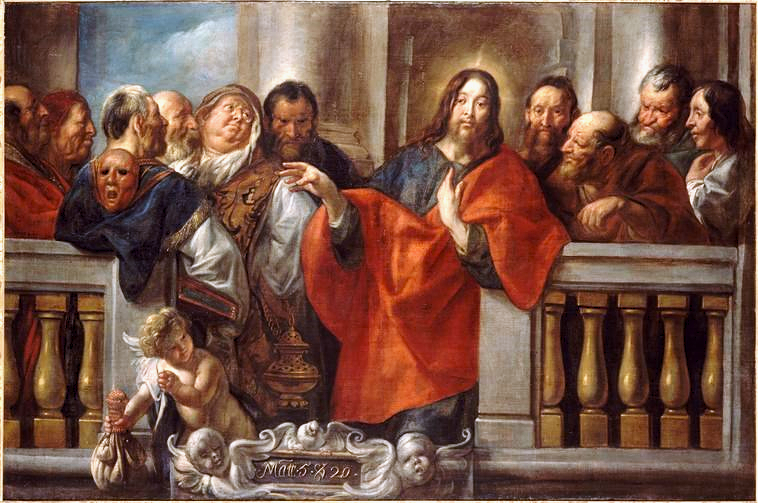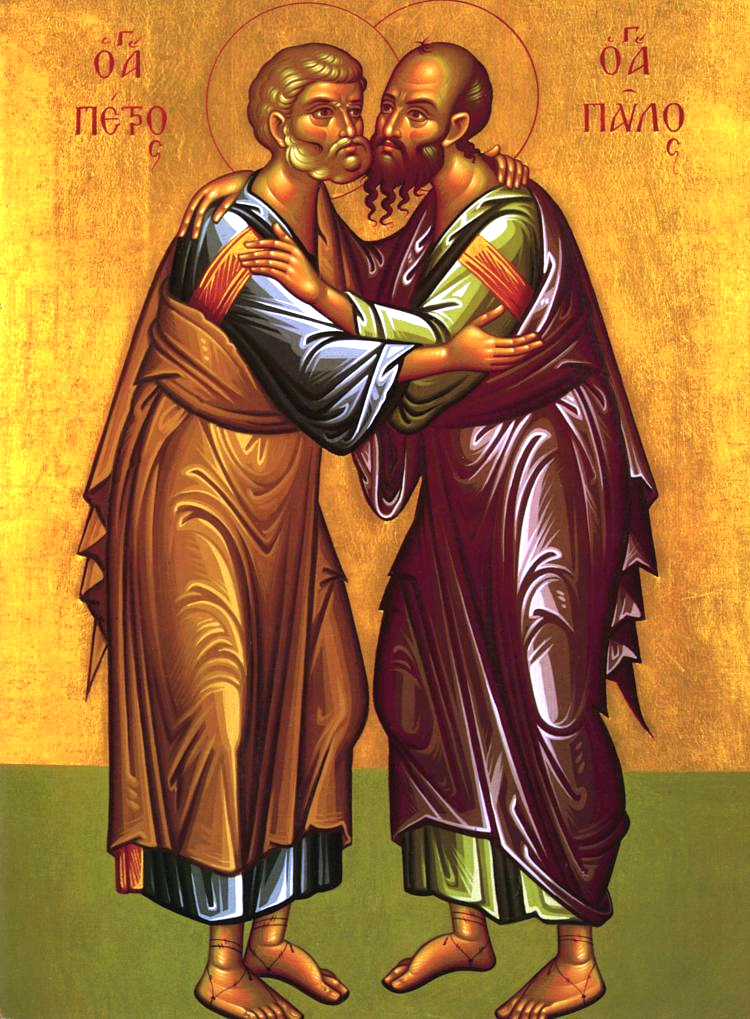Translation From the Holy Gospel According to Matthew
At that time the Pharisees came to Jesus, and one of them, a doctor of the law, asked Him, tempting Him: Master, which is the great commandment of the law? Jesus said to him: Thou shalt love the Lord thy God with thy whole heart, and with thy whole soul, and with thy whole mind. This is the greatest and the first commandment. And the second is like to this: Thou shalt love thy neighbor as thyself. On these two commandments depends the whole law and the prophets: And the Pharisees being gathered together, Jesus asked them, saying: What think you of Christ, whose son is He? They say to Him: David’s. He saith to them: How then doth David, in spirit, call Him Lord, saying: The Lord said to My Lord: Sit on my right hand until I make Thine enemies Thy footstool? If David then call Him Lord, how is He his son? And no man was able to answer Him a word; neither durst any man, from that day forth, ask Him any more questions.
A Message From Pope Benedict XVI’s Homily for the Mass of the Conclusion of the 12th Ordinary General Assembly of the Synod of Bishops, Oct. 26, 2008
The Word of the Lord reminded us that the whole divine law is summarized in love. The Evangelist Matthew narrates that after Jesus had answered the Sadducees, silencing them, the Pharisees met to put him to the test (cf. Matt 22:34-35). One of them, a doctor of law, asked him: Teacher, which is the greatest commandment in the law? (Matt 22:36). The question makes apparent the concern, present in ancient Jewish tradition, over finding a unifying principle in the various formulations of God’s will. This was not an easy question, considering that in the law of Moses, a good 613 precepts and prohibitions are contemplated. How does one discern, among all of these, which is the most important? But Jesus does not hesitate, and readily responds: You shall love the Lord your God with your all your heart, and with all your soul, and with all your mind. This is the great and first commandment (Matt 22:37-38). Jesus quotes the Shemà in his answer, the prayer the pious Israelite recites several times a day, especially in the morning and in the evening (cf. Dit 6:4-9, 11:13-21; Num 15:37-41): the proclamation of the integral and total love due to God, as the only Lord. Emphasis is placed on the totality of this dedication to God, listing the three faculties that define man in his deep psychological structures: heart, soul and mind. The word mind, diánoia, contains the rational element. God is not only the object of love, commitment, will and sentiment, but also of the intellect, which should not be excluded from this milieu. Then, however, Jesus adds something which, in truth, had not been asked by the doctor of law: And a second is like it, You must love your neighbour as yourself (Matt 22:39). The surprising aspect of Jesus’ answer consists in the fact that he establishes a similarity between the first and the second commandments, defined this time too with a biblical formula drawn from the Levitical code of holiness (cf. Lev 19:18). And thus by the end of the passage the two commandments become connected in the role of a fundamental union upon which all of biblical Revelation rests: On these two commandments the whole law is based, and the prophets as well (Matt 22:40).
The Gospel passage on which we are focusing makes clear that being disciples of Christ means practicing his teachings, which can be summarized in the first and greatest commandment of the divine law, the commandment of love. Even the Book of Exodus insists on the duty of love; a love witnessed concretely in relationships between persons, which must be relationships of respect, collaboration, generous help. The neighbour to be loved is the stranger, the orphan, the widow and the needy, in other words, those citizens who have no “defender”. The holy author goes into details, as in the case of the object pawned by one of these poor persons (cf. Exo 22:25-26). In this case God himself is the one to vouch for the neighbour’s position.
In St. Paul’s Epistle to the Thessalonians, we can find a concrete application of the supreme commandment of love in one of the first Christian communities. St Paul writes leading them to understand that, while having known them for such a short time, he appreciates them and holds them dear in his heart. Because of this, he pinpoints them as a model for all the believers of Macedonia and Achaia (1 Thes 1:7). Weaknesses and difficulties are not lacking in this recently founded community, but it is love that surpasses all, renews all, conquers all: the love of those who, knowing their own limits, docilely follow the words of Christ, the divine Teacher, passed down through one of his faithful disciples. You, in turn, became imitators of us and of the Lord, receiving the word despite great trials, with the joy that comes from the Holy Spirit, the Apostle wrote. He continued: For not only has the word of the Lord sounded forth from you in Macedonia and Achaia, but your faith in God has gone forth everywhere (1 Thes 1:6, 8). The lesson that we can draw from the Thessalonians’ experience, an experience that is truly common in every authentic Christian community, is that neighbourly love is born from docile listening to the divine Word. It is a love that will even withstand difficult trials for the truth of the divine Word, and in this way true love grows and truth shines in all its splendour. How important it is to listen to the Word and incarnate it in personal and community life!
In this Eucharistic celebration we sense, in a particular way, the bond that exists between the loving listening to the Word of God and disinterested service of the brethren…
…
The Church’s principal task is above all to nourish herself on the Word of God, in order to make new evangelization, the proclamation in our day, more effective. What is needed now is that this ecclesial experience reach every community; it is necessary to understand the need to translate the Word we have heard into gestures of love, because this is the only way to make the Gospel proclamation credible, despite the human weaknesses that mark individuals. First of all this requires a more intimate knowledge of Christ and an ever more docile listening to his Word.
[Let us] make the words of the Apostle our own: Woe to me if I do not preach the gospel (1 Col 9:16), I hope with all my heart that this yearning of Paul’s will be felt in every community with ever greater conviction as a vocation in the service of the Gospel for the world. [Let us recall] Jesus’ appeal: the harvest is rich (Matt 9:37), an appeal we must never tire of responding to, no matter what difficulties we might encounter. So many people are seeking, sometimes unknowingly, to encounter Christ and his Gospel; many need to find in him the meaning of their lives. To give a clear and common witness to a life according to the Word of God, demonstrated by Jesus, is therefore an indispensable criterion to verify the mission of the Church.
The Readings today’s liturgy offers for our meditation remind us that the fulness of the law, as all of the divine Scriptures, is love. Therefore anyone who believes they have understood the Scriptures, or at least some part of them, without undertaking to build, by means of their intelligence, the twofold love of God and neighbour, in reality proves to be still a long way from having grasped its deeper meaning. But how can we put this commandment into practice, how can we live the love of God and our brothers without a living and intense contact with the Sacred Scriptures? The Second Vatican Council asserts that access to sacred Scripture ought to be open wide to the Christian faithful (Dei Verbum 22), so that persons, encountering the truth, may grow in authentic love. This is a requisite that is indispensable for evangelization today. And since often the encounter with Scriptures is in danger of being not “a fact” of the Church, but informed by subjectivity and arbitrariness, a robust and credible pastoral promotion of the knowledge of Sacred Scripture to announce, celebrate and live the Word in the Christian community becomes indispensable, dialoguing with the cultures of our time, placing ourselves at the service of truth and not of current ideologies, and increasing the dialogue God wishes to have with all men (cf. ibid., DV 21). To this end special care should be given to the preparation of pastors, who are then ready to take whatever action is necessary to spread the biblical movement with appropriate means. Ongoing efforts to give life to the biblical movement among lay people should be encouraged, along with the formation of group leaders, with particular attention being paid to the young. We must also support the effort to allow faith to be known through the Word of God to those who are “far away” as well and especially those who are sincerely seeking the meaning of life.
Many other reflections could be added but I will limit myself to underlining that the privileged place where the Word of God resounds, which edifies the Church, is undoubtedly the liturgy. This is where it appears that the Bible is a book of the people and for the people: a heritage, a testament consigned to readers so that the salvation history witnessed in the text becomes concrete in their own lives. There is therefore a vital, reciprocal relationship of belonging between the people and the Book: the Bible remains a living Book with the people its subject who read it. The people cannot exist without the Book, because in it they find their reason for being, their vocation and their identity. This mutual belonging between people and Sacred Scripture is celebrated in every liturgical assembly, which, thanks to the Holy Spirit, listens to Christ, since it is he who speaks when the Scripture is read in the Church and welcomes the Covenant that God renews with his people. Scripture and liturgy converge, therefore, with the single aim of bringing the people to dialogue with the Lord and to obedience to the will of the Lord. The Word issued from the mouth of God and witnessed in the Scriptures returns to him in the form of a prayerful response, a response that is lived, a response that wells up from love (cf. Isa 55:10-11).
Let us pray that from renewed listening to the Word of God, guided by the action of the Holy Spirit, an authentic renewal in the universal Church and in every Christian community may spring forth. We entrust [ourselves] to the maternal intercession of the Virgin Mary… May Mary Most Holy, who offered her life as the servant of the Lord (Luke 1:38), so that everything would happen according to the divine will and who exhorts us to do whatever Jesus would tell us (cf. John 2:5), teach us to recognize in our lives the primacy of the Word that alone can grant us salvation. Amen!



